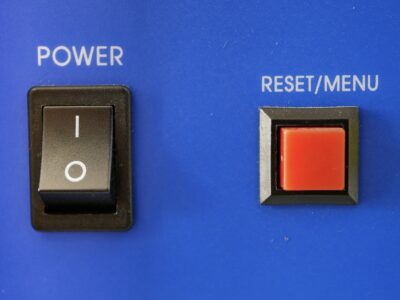So last week I checked out, completely.
My total creative output was four really awful Facebook Lives, in which I look like I’m auditioning as an extra for The Walking Dead and sound only marginally more coherent.
At home, it was like my batteries had run out. I did nothing, barely getting out of bed. I didn’t read, because I couldn’t focus. Even watching TV felt like an effort. Instead I ate my own (rapidly rising) bodyweight in carbs, and stared slack-jawed into space. A lot.
Most of my energy over the last five weeks has been focussed on my elderly mum. She got the virus early on, and was very ill. Then, when it became clear she would recover, it was all about getting support in place so that she could come home safely.
She left hospital last week. And is as cheerful and well as can be expected, in the circumstances. It was me who was in trouble.
Suddenly, everything that has been happening in the world hit me, like a speeding truck. Lockdown. The virus. Anxieties about my friends, my finances, the future. As well as sheer exhaustion. There hasn’t been a lot of sleep, over the past few weeks.
We all have our own red flags.
Comfort eating is always a sure sign I’m tipping over the edge. As is spending hours playing mindless computer games, and obsessively checking news feeds.
You’ll have warning signs of your own. Obsessive cleaning. That third tub of ice-cream. Watching day-time TV shows like Homes Under The Hammer and Bargain Hunt and getting really invested in the results. Over-exercising, or suddenly going from 5k a day to couch potato. Sudden bursts of anger over things that really aren’t that important.
Whatever you tend to do when you’re over-tired or creatively and emotionally depleted, make sure the people around you know the warning signs. And give them permission to alert you. (Because you’ll often be the last person to notice it.)
Then here’s the important thing to be aware of: do not push on through. You won’t do good work. But you will eventually push yourself into total burnout.
Instead create an emergency routine, to get you rested, and back on form. Everyone’s will be different, though sleep should always be part of it.
My exhaustion emergency routine

My rest and reboot routine been perfected over a lifetime of long-haul travel, working to impossibly tight deadlines, and pushing on through past the point of idiocy.
It’s simple, and obvious. But when I need it most, I tend to want to do the complete opposite. I’m tired, so I’ll sit up all night reading, playing a game, or doing a long-delayed or trivial task that suddenly, out of nowhere, feels vitally important.
The routine below is something I have to force myself to do. But it brings me back quickly.
- Cancel or postpone everything for the next 48 hours.
- Run a bath. Throw in whatever fancy products I can find in the cupboard. Put some good music on. Get in, for at least 30 minutes.
- Go to bed, closing the curtains and making the room as dark and quiet as possible. Then sleep, for as long as I can.
- If I can’t sleep, read in bed until I can. Something escapist and undemanding. But no screens in the room, under any circumstances.
- Super-healthy meals of salad, fruit, lean protein and lots of veggies. Only whole grains such as brown rice, if I have carbs at all.
- A long walk along the beach, or in the woods.
- Nap, meditation, or more sleep.
- A long, relaxed chat with a close friend. (No complaining allowed.)
- Watch an idiotic comedy/comfort film, preferably on the sofa with my family.
- Yet more sleep.
Sometimes, that’s enough. Once I’ve rested and replenished, I’m ready to jump right back in and take up where I left off.
But we all have times when our creative work stalls.
When we put off starting again, and sit about feeling guilty and beating ourselves up. This kind of self-loathing is a sure sign of creative constipation, and what we need most is to get into action again, to make work. But that’s sometimes easier to say than to do.
It’s important to understand that there is nothing wrong with you. You are not broken. You just need a reset.
Follow these simple steps.
1. Commit to a daily action that is so small it’s laughable.
For me, this is writing 200 words. I can do this in 10-15 minutes, even if I’m being slow or fussy.
I’m a professional writer. When I’m in flow, I write for 2-4 solid hours a day. More, if I’m on a deadline. When I’ve really got it going on, I can produce up to 10,000 words a day.
But this is not about my ideal, or my best. It’s about getting started again. For that, 200 words is just fine. It’s also 200 more than I would have written, had I not started small.
2. Schedule it
Even when your goal is laughably small, it’s easy to convince yourself you’ll start later. Then you spend the whole day in a kind of limbo where you’re not relaxed, but not working either.
So decide exactly when you’ll do the work, and where. If you need to, lay out what you need the night before: your art supplies, your studio set-up, your sewing machine. You’re aiming to make it as easy as possible to begin, and get it done.
3. Forget perfect
Let go of good, even. You’re not trying to change the world, right now. Or trying to make great art, to win awards. You’re just putting a toe back in the water, trying to produce something, anything.
Once you get momentum going, you’ll do better. But for now, this is just about working towards a Shitty First Draft, something you can hone and improve later.
After you’ve reached your laughably small goal, you are welcome to carry on, if you want to. But you are equally welcome to stop. The rest of the day is yours, to enjoy without guilt. Just make sure you do something replenishing, and read, see or do something or connect with someone inspiring.
Back on track
I find that after a few days I get back into flow and want to carry on. But when I’m really stuck, I just gently expand my laughably small goal, week after week, until I no longer need it.
For many of us, the lockdown is going to continue for weeks, maybe months more. We’re all up and down during this difficult time, and that’s fine.
But moving forward on your creative projects – even at this gentle, undemanding pace – will help you feel better.
So what’s your laughably small goal?
Like this? If so you might also enjoy my free 10-day course, Freelance Foundations: the secrets of successful creatives.






What do you think?